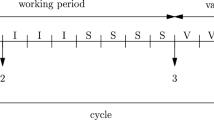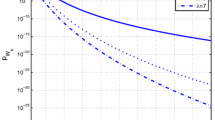Abstract
This paper considers queues with server vacations, but departs from the traditional setting in two ways: (i) the queueing model is driven by Lévy processes rather than just compound Poisson processes; (ii) the vacation lengths depend on the length of the server’s preceding busy period. Regarding the former point: the Lévy process active during the busy period is assumed to have no negative jumps, whereas the Lévy process active during the vacation is a subordinator. Regarding the latter point: where in a previous study (Boxma et al. in Probab. Eng. Inf. Sci. 22:537–555, 2008) the durations of the vacations were positively correlated with the length of the preceding busy period, we now introduce a dependence structure that may give rise to both positive and negative correlations. We analyze the steady-state workload of the resulting queueing (or: storage) system, by first considering the queue at embedded epochs (viz. the beginnings of busy periods). We show that this embedded process does not always have a proper stationary distribution, due to the fact that there may occur an infinite number of busy-vacation cycles in a finite time interval; we specify conditions under which the embedded process is recurrent. Fortunately, irrespective of whether the embedded process has a stationary distribution, the steady-state workload of the continuous-time storage process can be determined. In addition, a number of ramifications are presented. The theory is illustrated by several examples.
Similar content being viewed by others
References
Bertoin, J.: Lévy Processes. Cambridge University Press, Cambridge (1996)
Boxma, O.J., Kella, O., Mandjes, M.: On a generic class of Lévy-driven vacation models. Probab. Eng. Inf. Sci. 24(1), 1–12 (2009)
Boxma, O.J., Mandjes, M., Kella, O.: On a queueing model with service interruptions. Probab. Eng. Inf. Sci. 22, 537–555 (2008)
Doshi, B.T.: Queueing systems with vacations—a survey. Queueing Syst. 1, 29–66 (1986)
Doshi, B.T.: Single server queues with vacations. In: Takagi, H. (ed.) Stochastic Analysis of Computer and Communication Systems, pp. 217–265. North-Holland, Amsterdam (1990)
Kella, O., Whitt, W.: Useful martingales for stochastic storage processes with Levy input. J. Appl. Probab. 29, 396–403 (1992)
Kyprianou, A.E.: Introductory Lectures on Fluctuations of Lévy Processes with Applications. Springer, Berlin (2006)
Prabhu, N.U.: Stochastic Storage Processes. Springer, New York (1998)
Sato, K.: Lévy Processes and Infinitely Divisible Distributions. Cambridge University Press, Cambridge (1999)
Takagi, H.: Queueing Analysis, vol. 1: Vacation and Priority Systems, Part 1. North-Holland, Amsterdam (1991)
Author information
Authors and Affiliations
Corresponding author
Additional information
Part of this work was done while O. Kella was at EURANDOM, P.O. Box 513, 5600 MB Eindhoven, The Netherlands.
Part of this work was done while M. Mandjes was at Stanford University, Stanford, CA 94305, USA.
Rights and permissions
About this article
Cite this article
Kella, O., Boxma, O. & Mandjes, M. On Lévy-driven vacation models with correlated busy periods and service interruptions. Queueing Syst 64, 359–382 (2010). https://doi.org/10.1007/s11134-010-9166-1
Received:
Revised:
Published:
Issue Date:
DOI: https://doi.org/10.1007/s11134-010-9166-1




